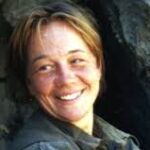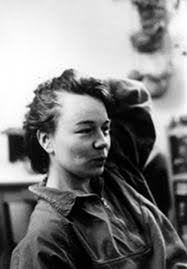Heval Ronahî, Andrea Wolf, was murdered by the Turkish state on the 23rd of October 1998 together with 23 of her comrades in Catak, Northern Kurdistan. Ronahî was a German revolutionary that had joined the PKK movement. In 1996, she stayed at the Academy of Şehîd Mahsum Korkmaz in Damascus with Rêber Apo (Abdullah Öcalan). Learning from him, she gained a perspective on internationalism and the revolution in Europe as well as on the freedom of the Kurdish people. Here Heval Ronahi gave her promise to follow and deepen the revolutionary path. Afterwards, she went to the free mountains of Kurdistan and took her place as a member of the free women’s army YAJK in the war against the occupiers of Kurdish soil. 26 years ago today, she gave her soul to the revolution in the mountains of Botan and became immortal.
The revolutionary Andrea Wolf, Şehîd Ronahî, was born in 1965 in Munich, Germany. From her youth onwards, she and her brother participated in the anti-system youth movement. As punks, they didnt accept capitalism, fascism and racism and carried out actions against the police, fascists and ecological disastrous construction projects. In 1981 she was arrested and spent months in prison, which motivated her to struggle even harder. Şehîd Ronahî took part in the radical feminist movement and organized many actions, both legal and illegal. In this time the so called autonomous movement, which Heval Ronahî was a part of, was very strong among the youth in Germany. In the 80‘s she participated in significant ecological and anti-capitalist struggles. She and her group participated in the protest to stop the atomic power plant in Wackersdorf and also in the protest against the enlargement of the airport in Frankfurt (Startbahn West). In Frankfurt she also built women‘s structures, they occupied houses and built revolutionary feminist centers. She always recognized the importance of the mentality of self-defence and trained in martial arts – from the cities in Germany to the mountains of Kurdistan she would teach Karate to her comrades. While she was participating in revolutionary organizations, agents of the German secret service were in her very close surroundings three times.

In this way, she personally got to know the reality of the German state, and understood the difference between the truth of revolutionary resistance and betrayal. In 1987, as a consequence of betrayal by agents, she had to spend another year in prison. She stayed in contact with RAF members (Red Army Fraction) with letters, discussing ideological and political topics. In all of her organizing, Şehîd Ronahî was known to be very clear, decisive and radical. When after the fall of real socialism the leftist organizations fell into a serious crisis she didn‘t stop her activities and continued to take up the initiative. In Frankfurt they built up the organization „No peace“ (the full name was „No peace with the banks“) and struggled for a new revolutionary anti-capitalist identity. The group focused mainly on sabotage actions. They were looking for a new way to make a revolution in Germany. Besides participating in these illegal actions, Heval Ronahi was also took part in the organization of a support network for the self-defence of migrants against fascist attacks. In this time, at the end of the 80’s, she also got to know the PKK during her participation in campaigns against the law for criminalizing political organizations (§129 a) and b)). In 1995 she had to go into hiding due to an arrest warrant, issued because of an obviously constructed participation in an action carried out by the RAF. Şehîd Ronahî criticized the German revolutionaries a lot and saw the necessity to build up a new form of organization. On this basis, she deepened her understanding of internationalism and, in the year 1996, left for Kurdistan.
Şehîd Ronahî took part in the Academy of Mahsum Korkmaz and was deeply influenced by it. Rêber Apo‘s (Abdullah Öcalan) stance on life and his friendship had an especially big influence on the German revolutionaries. In her diary she explained that she never met another human like him in her life, who, as a man, took the freedom of women equally seriously and put so much effort into it: “The men, in order to show who they are, are always „better“ than women. I know only one human, that, as a man, really is interested in our liberation: Abdullah Öcalan. He is not only talking about it, but this interest finds its realization in his actions and orders. He says, that the man is capitalism, the woman is socialism.”
Şehid Ronahî got her code name from Şehîd Ronahî (Bedriye Taş) who set herself on fire in Germany on Newroz 1994 together with Şehîd Bêrîvan (Nîlgûn Yildirim). This action was directed against the banning the PKK and the Kurdish liberation struggle by the German state, as a consequence of which many comrades were put into prison. By taking up her name, Şehîd Ronahî became an answer to the action of Şehîd Ronahî and Şehîd Bêrîvan, showing that the German and Turkish states cannot seperate people thriving for freedom from each other, and that the attacks against the PKK also sparked fires of resistance in other peoples around the world. Şehîd Ronahî participated in the ranks of the guerilla as a German revolutionary and like this spread the fire of resistance of the Kurdish people.

Şehîd Ronahî gave instruction in the mountains for physical conditioning, self-defence, and swimming to young female comrades. She took part in the war against the KDP and insisted on going to Botan, where she went in 1997. She knew that there was a chance to fall Şehîd there, and with a strong internationalist consciousness she took part in guerilla life. She said that it is not important in which place we will fall in the revolution, but we have to know for what cause we are fighting.
Şehîd Ronahî, with her personality, became one of the lights to show us our way as internationalist women and internationalists in general. Her personality is still an example for us today.
*For this text we took passages from a writing about Şehîd Ronahî that was published before on the News Agency ANF: https://anfenglishmobile.com/features/the-path-of-revolutionary-internationalism-Sehid-ronahi-63267
The book that was made by comrades of hers based on her diary and other documents can be read in German language:
ronahi_andrea_buch